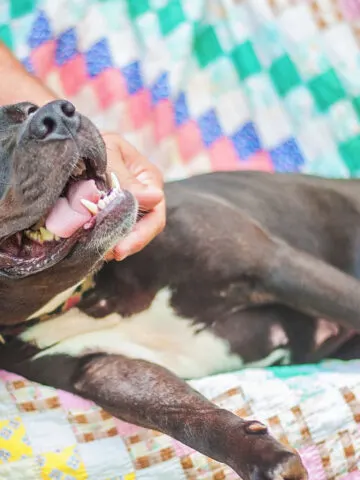Although the reputation of the Pit Bull would have people believe this is a dangerous, aggressive, and violent dog, these stereotypes couldn’t be any further from the truth.
The Pit Bull is a loving, affectionate, and fiercely loyal dog dedicated to his family. This dog breed does phenomenally well with children and is an excellent and devoted family member.
Even though the Pit Bull has a relatively short coat, this is not a hypoallergenic dog breed that can trigger an allergic reaction.
Although only a moderate shedder, the Pit Bull is prone to skin allergies which can accelerate shedding.
Proper grooming and nutrition can mitigate shedding and make this dog manageable for those with mild allergies.
Adding a Pit Bull to your home should be done cautiously, especially if you have known pet allergies.
The actual Pit Bull breed combines four different dog types, each with varying coats with different shedding levels.
Be sure to meet the individual dog you will adopt to determine how intense shedding will be. Proper grooming and brushing can help mitigate shedding and ultimately lead to a healthier and happier dog.
What Is Hypoallergenic?
Several dog breeds are labeled as hypoallergenic. While these particular breeds may seem like an instant solution for those suffering from pet allergies, the hypoallergenic designation may not be as good as it looks.
Ultimately, there is no such thing as a truly hypoallergenic dog. Instead, dogs that are labeled as hypoallergenic usually means they experience minimal shedding throughout their lives.
Because many pet allergies are triggered by shed hair and dander, a dog that sheds only minimally is not likely to produce an allergic reaction.
Even though a dog is labeled hypoallergenic, it is still possible to create an allergic reaction in people through its saliva and urine, containing proteins known to be allergens.
Do Short-Haired Dogs Help With Allergies?
If you suffer from pet allergies but want to adopt a dog, you undoubtedly are looking for measures to reduce your allergic reactions.
Many people search for short-haired dogs to reduce the amount of fur and dander circulating in their homes, thus limiting allergy symptoms.
While this logic makes some sense, finding a short-haired dog is not a viable solution to pet allergies. The more significant factor to consider is how much the dog will shed.
When a dog sheds, loose fur and dander are left to circulate in your home, causing a spike in allergies. For most people, allergies will be triggered regardless of hair length.
There are plenty of hypoallergenic dogs, like Lhasa Apsos and Afghan Hounds, with extremely long hair that rarely shed.
Conversely, there are several short-haired dogs, like Pugs and Pit Bulls, that can be extreme shedders, leading to ongoing allergens in your home.
Can You Make A Dog Hypoallergenic?
Unfortunately, try as you might, you cannot make a dog completely hypoallergenic.
However, there are essential steps you can take to help reduce the likelihood that your pet will induce a severe allergic reaction.
By limiting the number of allergens in your home environment, you’ll be able to reduce the severity of your allergies.
Often, creating a more hypoallergenic dog is a combination of preventative measures focused on your dog and your cleaning regimen.
You’ll want to focus on grooming and general skincare for your dog while maintaining a clean home free of dust, dander, and pet hair.
With the proper steps, many people can drastically reduce the severity of their pet allergies.
How Important Is Grooming When Dealing With Pet Allergies?
If you suffer from pet allergies but own a dog, your grooming routine will impact how severe your allergy symptoms become. Grooming is a great way to mitigate and even eliminate pet allergies.
Grooming your Pit Bull consists of brushing and bathing your pet.
While you cannot completely eliminate shedding, properly grooming your Pit Bull can significantly reduce the amount of fur and pet dander circulating through your home.
Brushing your pet not only helps to remove dead and loose hairs from your dog’s coat but also helps to condition and moisturize your pet’s hair.
Brushing involves pulling the essential oils from your pet’s skin through to the ends of the hair, which can make your pet’s fur healthier.
Healthy fur is less likely to fall out, reducing the amount of shedding in your home. Regular bathing can also help keep your pet’s shedding under control.
Not only can bathing eliminate loose hairs, but it will help keep your pet’s skin in excellent, healthy condition. Using a moisturizing shampoo can further benefit your pet, leading to reduced shedding.
How Much Do Pit Bulls Shed?
When working with Pit Bulls, there is a wide range of possibilities when it comes to shedding.
The Pit Bull breed encompasses four distinctly different dog breeds, which are often bred together to create a homogenous mix of dog and hair types.
While some Pit Bulls may only shed slightly, other Pit Bulls can be profuse shedders. For Pit Bulls, the amount of shedding really comes down to the individual dog.
Keep in mind poor nutrition, stress, or allergies can also contribute to excessive shedding in this breed. Pit Bulls are prone to allergies, particularly skin allergies.
Does Nutrition Impact Shedding?
Your pet’s nutrition is vitally important to overall health, inclusive of your pet’s fur and skin. Having a healthy diet is essential and can even reduce the amount of shedding.
Many dogs, mainly Pit Bulls, have extreme food-based allergies that can trigger shedding, causing excessive hair loss.
All too often, dogs have an allergic reaction to low-quality foods, which causes the skin to become dry. When the skin dries out too much, it can cause the hair to fall out more than usual.
Maintaining a healthy diet for your pet is essential. Good nutrition that is high in protein and fats can lead to a healthy and beautiful coat.
If your pet is not getting the proper nutrients from its food, adding a fatty acid supplement daily can help limit shedding and restore the healthy and natural oils to your pet’s skin.
How Do I Know If I Have Pet Allergies?
Pet allergies can develop in people at any point in their life. Some people are born with allergies, and for others, pet allergies will develop as an adult.
Symptoms of pet allergies are rather universal throughout the population, with most allergy sufferers reporting similar symptoms.
You may suffer from pet allergies if you notice the following symptoms develop after coming in contact with a dog.
Likely symptoms include:
- Sneezing
- Stuffy or Runny Nose
- Swollen Face
- Itchy or Watery Eyes
- Couching, Wheezing, or Tightness in the Chest
- Rash or Hives on the Skin
Luckily, most pet allergies are mild to moderate and can be treated with over-the-counter medication. An antihistamine or nasal spray is usually enough to combat the acute onset of pet allergies.
Can My Pet Also Suffer from Allergies?
Just like people can get allergies, pets are also prone to allergies. Pit Bulls, in particular, are extremely prone to allergies, especially skin allergies. In Pit Bulls, skin allergies are called “atopy.”
Usually, allergies appear as red spots or areas with hair loss that occur on the paws, face, between skin folds, or the stomach.
Skin allergies can be caused by just about anything in Pit Bulls, ranging from food sensitivities to environmental allergies.
If left untreated, allergies in Pit Bulls can become severe, leading to extensive hair loss, open sores, and even infection. Luckily, treating allergies in dogs is easy with simple mediation.
Sometimes, Benadryl intended for humans is enough to prevent allergic reactions in dogs from worsening.
In extreme cases, prescription allergy medication may be necessary. If your pet is experiencing allergies, talk to your vet today about possible allergy medication to mitigate and eliminate symptoms.
Related Questions
Why do Pit Bulls have a bad reputation?
Unfortunately, Pit Bulls have a terrible reputation for being aggressive or violent dogs. Much of this stigma is related to this dog being used for dog fighting around the world.
Fighting dogs are conditioned to be aggressive, and this is a taught behavior rather than an inherent trait.
Aggressiveness in the Pit Bull breed is something that is learned and created. At their core, Pit Bulls are intelligent, loving, and affectionate dogs.
Do Pit Bulls make good service dogs?
While a terrible stigma is attached to the Pit Bull breed, these dogs are intelligent, gentle, and hard workers. These attributes make them excellent service dogs.
Not only are Pit Bulls big enough to pull a wheelchair, but they’re intelligent enough to help support mobility issues.
Plus, these intelligent dogs can work in intuitive functions, like offering physical and emotional support to those with anxieties.
The Pit Bull has also been trained to be a medical alert dog, helping owners know when their glucose drops too low or when they may have a seizure.
Our team is composed of pet care professionals, veterinarians, and pet owners. To date, we’ve conducted thousands of hours of research to publish the most accurate pet information.
Most of the writers on our site are vets with 10+ years of clinical experience, ranging from small practice, to equine practice, academia, and surgery. Our goal is to help every pet owner get the information they seek about their dear companions.



Leave a comment
You must be logged in to post a comment.